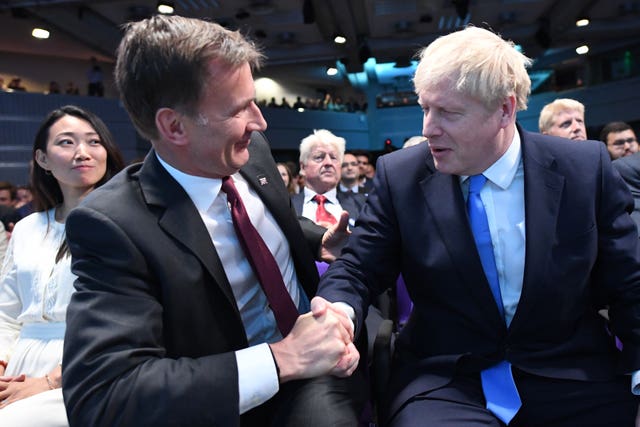
The UK’s incoming Prime Minister, Boris Johnson, is the subject of editorials and comment pieces at home and abroad.
The Daily Mail, which has long championed Mr Johnson, in its leader says Mr Johnson’s acceptance speech was fitting for the summer weather.
It says: “Having finally secured the job he craved so desperately for so long, Boris Johnson’s acceptance speech yesterday was a typically bravura performance. Overflowing with optimism and bonhomie, he bathed the Tory faithful in balmy sunshine.”

But the paper cautioned that despite the “stirring words, now the real work begins”.
The Daily Mirror, which has never been Mr Johnson’s biggest supporter, titles its editorial: “Send in the Tory clown.”
It goes on to says that the new prime minister “inhabits a weird, make-believe fantasy world in which truth is the enemy, struggling to be honest about Brexit or any issue requiring sound judgement”.
The Daily Telegraph – which calls the new PM the “Dude” – contains a column from Philip Johnston pushing for “a snap election to replace this paralysed Parliament”.
The paper’s editorial calls the change of prime minister “a new chapter after three wasted years”. It adds: “His first task is to construct a Cabinet with the expressed purpose of delivering Brexit by October 31.”
The front page of tomorrow’s Daily Telegraph: 'Prime Minister Johnson to appoint Brexiteer Cabinet as he spends his first 100 days in No 10 focusing solely on leaving the EU on October 31' #tomorrowspaperstoday pic.twitter.com/CQbhLqQ2UL
— The Telegraph (@Telegraph) July 23, 2019
The Guardian’s editorial warns that “With Boris Johnson as PM Britain faces a hard Brexit after years of a clown.”
It adds: “The Conservative party has finally got a leader it deserves … (Mr Johnson) faces the most daunting challenge – that of how the UK can leave the European Union – on entering No 10 since Winston Churchill in 1940.”
Guardian columnist Rafael Behr writes of Mr Johnson that: “Ministers who witnessed the new Tory leader in action as foreign secretary testify to laziness, inattention to detail, contempt for relationships, congenital unseriousness and dangerous indiscretion.”
While Sun columnist Trevor Kavanagh writes confidently that “Boris will lead the Tories to victory in the next general election and put Brexit to bed”.
The Times’s editorial cautions that the Irish border remains a stumbling block.
It says Mr Johnson “has assembled a wide coalition of opinion within his own party that has taken him to the highest office. Holding that coalition together while making concrete proposals about the Irish backstop might prove altogether more difficult.”
Daniel Finkelstein, in an opinion column in The Times, says Mr Johnson’s best hope of survival is “gambling everything on going to the country”.
Boris Johnson skal nu bringe Storbritannien ud af det dødvande, Brexit har bragt landet i. Men mange andre opgaver ligger og venter. Læs nyhedsanalysen på https://t.co/BcTg6xsvuf pic.twitter.com/S6ZLt0z7Qv
— Politiken (@politiken) July 23, 2019
Meanwhile, on the other side of the Channel papers have also covered the new tenant at Number 10.
Danish title Politiken carries a leader column which pulls no punches, claiming that Mr Johnson – like US president Donald Trump – has “built his entire career on shameless lies and extreme self-promotion”.
Headlined “That a clown like Boris Johnson is set to become prime minister in the UK shows just how low the country has fallen since the Brexit referendum”, the column says British people deserve better leadership.
“The British people deserve much, much better political leadership than what they’ve got. And now one of the worst is becoming prime minister.
“Johnson’s victory is the epitome of injustice. It’s an obscene ascent to power.
“Johnson has – not unlike US president Donald Trump – built his entire career on shameless lies and extreme self-promotion.”
Swiss title Neue Zurcher Zeitung runs a column from its British correspondent Peter Nonnenmacher with the title: “He’s here – what now?”
He writes: “It will not be easy for him. From the situation in which he has manoeuvred, there is no apparent way out.
“With the solemn summoning of willpower and optimism alone, no state can be made. There must be more, much more.”
Three Flemish language Belgian titles all make reference to Brexit in their coverage – De Morgen writes the EU is “not afraid of Johnson”, de Standaard says Johnson “had 100 days” – a reference to the Brexit deadline of October 31 – and De Tijd writes “The loot has been secured”.
The Irish Times, in a strident editorial, refers to Johnson’s elevation as “a new nadir” for the UK.
It says the best hope for Ireland, Europe and “British citizens themselves – is that Johnson as prime minister will be guided by three of his worst traits, which together have defined his career: he doesn’t mean a word he says, he is obsessed with power and he is willing to betray those closest to him in the pursuit of that power.”


Comments: Our rules
We want our comments to be a lively and valuable part of our community - a place where readers can debate and engage with the most important local issues. The ability to comment on our stories is a privilege, not a right, however, and that privilege may be withdrawn if it is abused or misused.
Please report any comments that break our rules.
Read the rules hereLast Updated:
Report this comment Cancel